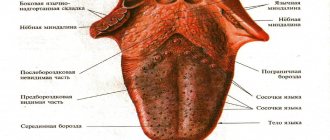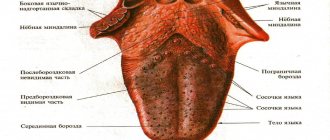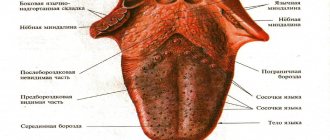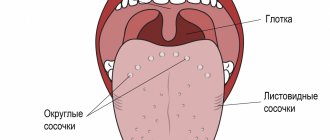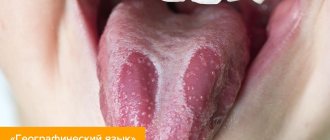Incredible facts
The human tongue is a muscular organ covered with a mucous membrane. This small organ performs many functions: it is an organ of taste and performs a tactile function, helps process food, and is involved in the process of swallowing.
Language influences the correct reproduction of sounds and determines the timbre of the voice. Without language, human speech is impossible. In infants, the tongue is responsible for the process of sucking milk. So what else do we not know about our language?
Correct tongue position - why is it important?
For the correct formation of a bite and coherent speech, the correct functioning of all elements of the dental system is important.
The position of the tongue also plays an important role. Under normal conditions, the tongue should exert slight pressure on the upper row of teeth, which contributes to the formation of a correct bite in childhood. The physiological position of the tongue has the following positive effects:
- The development of the upper jaw is stimulated, both in length and width.
- Blood microcirculation in the nasopharynx area improves. This helps strengthen local immunity, which is important, in particular, for protection against respiratory infections.
- Balance improves, which is a prerequisite for the formation of correct posture.
- The normal tone of the facial muscles is maintained in a calm state.
Radmila Yusupova
The young girl noticed her peculiarity in early childhood, when she wanted to appear on television. Mom said that people who appear on “TV” have something special and different from others.
Radmila began to carefully examine herself in the mirror, try out different facial expressions, and casually noted that her tongue, it turns out, was longer than that of others. After measurements, it turned out that the length of the girl’s tongue is more than 11 centimeters , and this is a record for Russia, which clearly looks like a TV story.
Now Radmila Yusupova is actively using her peculiarity and maintains pages on Instagram and YouTube, not hesitating to post photos and videos with masterly “language” tricks.
Radmila’s dream also came true - on the air of the “We Talk and Show” program, which airs on NTV, she was able to please her fans with tricks and even talk with Dzhigurda.
Tongue position - what does it affect?
The correct position of the tongue is the key to a physiological bite, as well as the absence of problems with swallowing, chewing and speech. Let's look at the main negative consequences that arise when the tongue is positioned incorrectly.
If the tongue is pushed back:
- Swallowing disorder is a disorder in the synchronization between swallowing and breathing.
- Pulling the lower jaw back.
- Dysfunction of the auditory tube.
- Violation of voice formation.
If the tongue is moved forward:
- Swallowing disorder.
- The lower jaw is pulled forward.
- Violation of voice formation.
- Curvature of teeth, especially the front ones.
- Protrusion of the tongue forward.
- Decreased lip tone (up to complete loss).
- Excessive tension transmitted to certain muscles and joints of the dental system.
Symptoms that occur due to improper tongue position include:
- violation of nasal breathing;
- swallowing disorder;
- speech defects;
- neuromotor development disorder;
- symptoms from ENT organs;
- malocclusion and other dental problems;
- dysfunction of the temporomandibular joint (TMJ);
- emotional disturbances.
Byron Schlenker - language record holder
The cheerful American looks completely ordinary from the outside; as soon as he opens his mouth, it becomes clear why the person is unique. Byron has the world's largest tongue, measuring 8.6 centimeters wide. This width is greater than the length of the beer mat, wider than the iPhone 6 by a couple of centimeters. Byron discovered this feature by accident. Having decided to help my daughter in the library with a school project, I became interested in looking at a copy of the Guinness Book of Records. Schlenker decided to independently measure his oral organ, after which he was convinced that it was wider than the record holder recorded in the Book by a whole centimeter.
Byron Schlenker - owner of the largest tongue
Of course, the whole family decided that they needed to apply to become the current world record holder. Now the man is a local celebrity in his hometown, which he is very happy about. The wife admits that the couple’s mutual friends never stop making fun of them, but she tries not to pay attention. Byron is very popular among local residents; people often stop him in a store or other public places and want to take a photo. Strangers on the street ask to sign copies of the Guinness Book of Books.
Why is the tongue positioned incorrectly?
There are several reasons that have a direct impact on the position of the tongue in the oral cavity:
- Nasal breathing disorder . This causes the tongue to move downwards. Such changes are necessary to facilitate oral breathing. Let us remember that mouth breathing, in turn, contributes to the formation of malocclusion. Therefore, parents need to closely monitor the respiratory condition of their children.
- Short bridle . In this case, the tongue is “sandwiched” by the short frenulum in a lowered position. Physically, the tongue is not able to fully press against the palate (the position of the tongue is physiologically correct).
- Curvature in the cervical spine . Dysfunction of the cervical spine has a direct impact on the position of the tongue.
- Disorders of muscles and nerves . Dysfunction of certain nerves and muscles of the maxillofacial area can cause improper tongue position. For example, this applies to the work of the glossopharyngeal and hypoglossal nerves, as well as the styloid-glossus and palatoglossus muscles. Disorders of the functions of these nerves and/or muscles lead not only to incorrect tongue position, but also to impaired swallowing and breathing.
The position of the tongue is also influenced by several factors, namely:
- Factors of intrauterine development - multiple pregnancy, uterine anomalies, uterine hypertonicity and others.
- Hereditary factors.
- Injuries to the fetus during childbirth.
- Prematurity.
- Artificial feeding. If a child is forced to be bottle-fed, then the development of the bite and dental system must be carefully monitored.
- Late introduction of solid food (when the child has been on a liquid diet for a long time).
- Bad habits – thumb sucking, object sucking, cheek biting, prolonged sucking of pacifiers.
- Premature loss of baby teeth.
- Frequent respiratory diseases (in particular, chronic sinusitis, enlarged adenoids and other diseases).
Teeth marks on the tongue are one of the signs of improper tongue position
Adrianna Lewis - unusual fame
Another American woman, whose originality lies in her very long mouth organ, a little more than 10 cm long, the whole world knows about it. Lewis posted a video where she demonstrates the longest, largest organ in full length; hundreds of thousands of curious Internet users watched the video. The organ is very similar to a snake, it easily reaches the elbow, the tip of the nose, the girl even manages to reach her eyes. Negotiations were actively conducted with representatives of the Guinness Book, the girl was successfully able to officially register the achievement, which she is very proud of.
Adrianna Lewis has the biggest tongue among women
Lewis's mother was the first to notice her daughter's uniqueness when she was 12 years old. The woman noted that the organ was amazing in size when the child began to grimace or eat ice cream. The girl’s abilities amazed those around her, she is not shy, she even loves to surprise others. Adrianna is often photographed with her mouth open, and her images have appeared in several print publications. Lewis even created her own channel on YouTube, where she clearly shows her original abilities and various tricks. The girl is accustomed to unflattering comments from others and Internet users, but this does not stop her.
Types of tongue malposition
There are 7 options for tongue position. The first one is correct, and all the others are variants of the incorrect location of the organ. Let's take a closer look at them.
Option 1 – physiologically correct tongue position
The palatal position of the tongue is considered correct1. The tongue at rest is pressed against the palate and is located behind the upper incisors. With this arrangement of the organ, a physiologically correct bite is initially formed (unless, of course, there are other reasons and factors for the development of pathological occlusion). In this case, for the formation of a correct bite, the general muscle tone of the face, the work of the temporomandibular joint and other elements of the dental system are also important.
Option 2 – loose fit to the palate
In this case, the tongue rests approximately 0.5 cm above the lingual tubercles. Also, the tongue may drop down by about 0.5-0.8 cm. Under such circumstances, the organ is not pressed tightly against the palate.
When swallowing in this case, the tongue will rest against the upper or lower incisors. This leads to tension in the muscles of the lower lip, which in turn tilts and crowds the lower teeth.
Option 3 - the tongue passes between the molars
With this arrangement, the tongue covers the lingual cusps. The tone of the lower lip is impaired, which leads to the formation of a deep bite. In this case, the lower teeth often crowd together due to lack of space.
It is noteworthy that over time, the severity of a deep bite may increase, and the lower jaw may shift to a posterior position. In this case, the person complains of limited mobility of the lower jaw (in particular, when opening the mouth).
Option 4 – the tongue covers the buccal and lingual cusps
If the tongue covers the buccal and lingual cusps of the lower molars and/or premolars, then in childhood this leads to problems with teething. The tongue puts pressure on the buds of baby teeth, preventing the latter from erupting. In the future, this may lead to disruption of the formation of the roots of permanent teeth. There is even a risk of tooth root resorption, which leads to adentia (tooth loss).
With the 4th variant of the tongue position, the muscle tone of the lips decreases. In such a situation, an inadequate load is placed on the temporomandibular joint, which leads to disruption of its function.
Option 5 – low tongue position
When the tongue is low, it becomes stiff. Often the tip and middle part of the tongue have increased tone. For this reason, such a language visually appears to be overly large. However, it is not. The tongue is of normal size, but the volumetric effect creates tone.
The low position of the tongue has a significant impact on the dental system, in particular the lower jaw. For this reason, excessive development of the lower jaw (macrognathia) with the formation of a mesial bite is possible. There is also a danger of underdevelopment of the upper jaw, which also forms a mesial bite.
When the jaw moves forward, the functioning of the jaw joints is also disrupted. This leads to characteristic clicking and pain when trying to open the mouth.
Option 6 – tongue between the upper and lower incisors
Often, with this position of the tongue, the orbital muscles of the mouth are weakened and the masticatory tone of the muscles is reduced. This is another option for the “low” location of the organ. Most often, in the 6th position, the tongue is not active enough, which leads to the development of speech defects. The distortion of whistling sounds is especially noticeable.
If with this arrangement the tone of the masticatory muscles is also disturbed, then lengthening of the face is possible, as well as discomfort and pain in the jaw joints. This is due to a violation of the distribution of loads on the facial muscles.
Option 7 – lateral position
Most often, the reason for this position of the tongue is bad habits (thumb sucking, biting nails, pens, etc.). Impaired innervation is another reason for lateral displacement of the tongue.
When the tongue is in a lateral position, swallowing is impaired. The tongue will put pressure on the side of the dental system where it deviates. This leads to uneven development of the jaws.
Plaque and possible diseases
During normal functioning of the body, the human tongue is covered with a thin, loose layer of whitish plaque. If it changes color or thickness, this is already an alarming signal.
White
A dense white coating can appear as a result of hypothermia or a slowdown in metabolism (this often happens in the fall). If the plaque is uniform, but very thick, this indicates the presence of a bacterial infection in the body, and if it forms lumps, this is a signal of a fungal disease.
A thick layer of white plaque also occurs with chronic gastritis with high acidity or enterocolitis. With gastritis with low acidity, the plaque is not as thick and drier. It is also interesting that by the thick white coating on the tongue you can recognize those with a sweet tooth and lovers of dairy products.
Grey
Gray plaque is a sign of infectious diseases accompanied by fever. Also, a grayish coating may indicate diseases of the gastrointestinal tract or liver. In particular, the tongue may acquire a grayish tint during an exacerbation of peptic ulcer disease. If a gray coating appears in the company of small blisters on the tongue, the person may be suffering from herpes. A grayish coating can also signal that the body lacks iron.
Brown
Most often, a tongue with a dense brown coating can be seen in smokers. The same symptom indicates disturbances in the respiratory system, which can lead to hypoxia. Also, brown plaque is a signal of digestive problems.
Yellow
If such a plaque appears in a person in the summer, this may indicate overheating of the body. The surface of the tongue also turns yellow after drinking coffee or certain spices. In more serious cases, the appearance of yellow plaque indicates a gastric ulcer, malfunction of the pancreas or liver.
Greenish
Plaque with a green tint is a very alarming signal. As a rule, it warns of serious liver diseases, including the development of cancer.
Training to improve the situation
It is possible and necessary to correct the position of the tongue. Myofunctional therapy has been developed for this purpose. It is used for both therapeutic and preventive purposes. The advantages of this treatment are that it can be performed at any age and at any stage of orthodontic treatment. In addition, mewing does not require special skills or experience. Myofunctional orthodontics specialists will simply show you exercises that need to be performed regularly. The patient’s task is to perform the complex in strict accordance with the doctor’s recommendations.
Here are some common exercises that will help correct the position of your tongue:
- Place your lips behind your lower teeth, press your tongue to the roof of your mouth, and tighten your chin. Hold this position for 5 seconds, then relax your muscles. Repeat 10 times.
- Place your tongue behind your upper teeth, lengthen your chin and tense your lower jaw and hold for 10 seconds. Repeat 10 times.
- The tongue must be placed in the palatine cavity and tense. Stay in this position for 10 seconds, then relax. Repeat 10 times.
- The starting position is the same as in the previous exercise. Now try to swallow saliva without using the muscles of your cheeks and lips. Only the muscles of the tongue should work. This exercise will be difficult for you at first, but every time you do it you will notice progress. Repeat 10 times.
- The starting position is the same as the previous exercise. Tighten your tongue and smile. Then use your index fingers to press on the corners of your mouth, trying to hold back your smile. After 10 seconds you can relax. Repeat 10 times.
- Pull your tongue forward as far as possible, trying to reach your chin. Hold for 5 seconds. Repeat 15 times.
- Extend your tongue, trying to reach the tip of your nose. Hold for 5 seconds. Repeat 15 times.
Chanel Tapper
The American also became a record holder in the Book of Records (the length of her tongue was 9.75 centimeters ). The girl noticed the peculiarity at the age of 8, when she was photographed with her mother on a holiday. Then she noted that her tongue was visually 2 times longer than her mother’s.
Subsequently, the peculiarity was noticed by her classmates, to whom Chanel Tapper gladly demonstrated various tricks. She calmly reaches her elbow and nose with her tongue, and also goes below her chin. The girl admits that she no longer has any complexes about the unusual length of the organ and is proud of her achievements.
FAQ
Will I be able to correct my malocclusion if my tongue position remains incorrect?
Modern orthodontics has a wide range of methods for correcting malocclusion. At the same time, bite correction must be comprehensive. A prerequisite is the elimination of all causes and factors leading to the formation of malocclusion. This also applies to correcting the position of the tongue.
Will myogymnastics help correct the situation?
Yes. Exercises will help correct the position of the tongue. But sometimes exercise is not enough. Additionally, orthodontic treatment to correct the bite is required. In some cases, surgery is needed.
Should the tongue rest on the teeth?
No, it should be located behind the teeth.
Top 10 people with the longest tongue in the world
- Stephen Taylor is a giant human tongue.
- Nick Stoberl is more than anyone in the world.
- Annika Irmler is the longest female tongue.
- Nick Afanasyev - success thanks to language.
- Chanel Tapper is the most unique girl.
- Adrianna Lewis is funny and quirky.
- Byron Schlenker has the biggest tongue.
- Emily Schlenker is a young world record holder.
- Yagya Katuwal is a very original person.
- Radmila Yusupova is a smiling girl.
Nick Stoberl
The young man defeated the previous record holder four years ago - the length of his tongue was just over 10 centimeters .
The record holder comes from America, where he works part-time as a comedian and artist. He optimistically and cheerfully demonstrates the peculiarity of his body to everyone, takes pictures with fans and maintains personal pages on social networks. The guy is glad that he can amuse his friends and fans with his tricks. Nick Stoberl admits that his father also had an unusually long tongue, meaning the phenomenon was inherited.
The guy said that it was not easy to officially register his record, since his ambitions coincided with the 60th anniversary of the existence of the Book of Records. So, before the anniversary edition, all record holders were checked very meticulously, but the guy was able to get into it, which he is very proud of.
Nick Afanasiev
A Russian emigrant, now living in the United States, decided to announce himself to the world and become famous. So, he discovered that the length of his tongue was 8.9 centimeters .
This feature could help him gain fame, especially since Nick Afanasyev dreamed of becoming a popular actor. The ability to reach his nose and elbow gained fame for the guy when he posted a video online. Then the views reached more than a million, and the guy began to receive long-awaited invitations to auditions.
Thus, the unusual young man starred in the teen series iCarly, and now his filmography has exceeded 10 projects. It turns out that not only speakers and singers can make money with a language.
Emily Schlenker - uniqueness by inheritance
The girl is the daughter of the previous world record holder; her uniqueness was inherited. The width of the organ is smaller than that of her father and is 7.3 cm, however, she and her father were included in the Guinness Book of Records as the couple with the largest tongues in the world.
Emily Schlenker is the daughter of the most tongue-in-cheek dad
When the father suggested that the child register a world record together, she didn’t even want to hear about it. But after repeated measurements, finally making sure that Emily’s oral organ was indeed larger, wider than the recorded record holder, although smaller than her father’s, the decision was made to submit an application.
№7
Very often you can hear that this is the strongest muscle in our body. This is actually not true. Yes, it is flexible, strong, almost never gets tired and helps to perform a number of important functions. However, it is not the strongest muscle. For example, the strongest muscle in terms of the force generated (pressure) is the masticatory muscle (it is also the strongest in our body). The strongest muscle in terms of duration of work is the heart.
№1
Human language has a complex architecture that allows it to move in different directions and take different forms. As we said earlier, the tongue is not one single muscle. It consists of eight muscles. Its structure is very similar to the trunk of an elephant or the tentacles of an octopus. This muscle structure is called the muscular hydrostat. Its muscles are the only muscles in our body that work independently of the skeleton.
